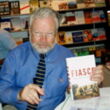In the graveyard of empires: America's war in Afghanistan
Description
More Details
Table of Contents
From the Book - First edition.
Similar Titles From NoveList
Similar Authors From NoveList
Published Reviews
Choice Review
The first battle in America's war on terror was fought in Afghanistan. Eight years later, it is still going on. Jones (analyst, RAND Corporation) has done an excellent job of retelling the story of the pivotal role that Afghanistan played at the end of the Cold War and in the origins of al Qaeda. He provides both a rich historical context and a nuanced analysis of the current complexities in the unruly regions on either side of Afghanistan's border with Pakistan. Based on standard histories, news accounts, and the author's own interviews with officials in Washington and Kabul, the book provides a clear picture of the difficult problems the US faces in Afghanistan. The author is realistic but not optimistic about prospects for dealing with those problems. At the end, he quotes a Taliban detainee who told his US captors that "You may have the watches, but we have the time." Time will tell whether counterinsurgency, nation-building, democratization, and the other daunting tasks in the war on terror have any prospects for succeeding in lands long inhospitable to foreign armies and central government. Summing Up: Highly recommended. All readership levels. R. A. Strong Washington & Lee University
Booklist Review
Jones traces the steady resurgence of the Taliban and its allies, facilitated by U.S. neglect and a weak government in Kabul, after a deceptively easy overthrow of the Taliban government in 2001. As to the future, Jones is realistic rather than pessimistic. It is essential, he asserts, that the U.S. resist the temptation to make the war its own, thus motivating Afghans to once again resist foreign domination. He then emphasizes a bottom-up approach, trying to forge bonds with local tribes and clans while building up the strength of Afghan security forces. He also points out the necessity of eliminating the Taliban's safe haven in Pakistan. He clearly knows the terrain and understands the nature of the struggle. Yet his strategy has elements of Nixon's failed policy of Vietnamization, as critics will surely point out. Still, this is a serious work that should be factored in as a new policy in Afghanistan evolves.--Freeman, Jay Copyright 2009 Booklist
Publisher's Weekly Review
Since 2001, RAND Corporation political scientist Jones (The Rise of European Security Cooperation) has been observing the reinvigorated insurgency in Afghanistan and weighing the potency of its threat to the country's future and American interests in the region. Jones finds the roots of the re-emergence in the expected areas: the deterioration of security after the ousting of the Taliban regime in 2002, the U.S.'s focus on Iraq as its foreign policy priority and Pakistan's role as a haven for insurgents. He revisits Afghan history, specifically the invasions by the British in the mid- and late-19th century and the Russians in the late-20th to rue how little the U.S. has learned from these two previous wars. He sheds light on why Pakistan-a consistent supporter of the Taliban-continues to be a key player in the region's future. Jones makes important arguments for the inclusion of local leaders, particularly in rural regions, but his diligent panorama of the situation fails to consider whether the war in Afghanistan is already lost. (July) (c) Copyright PWxyz, LLC. All rights reserved
Library Journal Review
Political scientist Jones's (RAND Corporation) groundbreaking, detailed account of American involvement in Afghanistan from the Soviet invasion of 1979 through 2009 is finally available on audio. Drawing from declassified documents and interviews with military, political, and national security experts, Jones holds that the United States followed the same failed path taken in Afghanistan by both Britain and the former Soviet Union. The chapter outlining the theoretical basis for insurgency is particularly enlightening. Voice-over artist William Hughes does an excellent job of presenting this important work, a definitive account of perhaps the most questionable American military and foreign policy exercise since Vietnam. Essential listening for all.-Stephen Hupp, West Virginia Univ. Parkersburg Lib. (c) Copyright 2010. Library Journals LLC, a wholly owned subsidiary of Media Source, Inc. No redistribution permitted.
Kirkus Book Review
A scholarly account of America's unsuccessful effort to avoid the same fate as three other great powers who tried to tame Afghanistan. RAND political scientist Jones (Foreign Service/Georgetown Univ.; The Rise of European Security Cooperation, 2007) begins by describing the failures of Alexander the Great, Victorian Britain and the Soviet Union, reminding readers that the United States missed its first opportunity in the area after the Soviet withdrawal in 1989. Delighted at humiliating our Cold War enemy, American forces withdrew, well-armed Afghan factions turned on each other and the nation descended into lawless chaos. Some semblance of order returned in the '90s when the Taliban conquered most of the country and established an oppressive Islamic regime. In 2001, enraged at its refusal to surrender Osama bin Laden, U.S. forces attacked the country and aided Taliban opponents, who triumphed in a few months. At this point, Jones slows to deliver a blow-by-blow account of how America squandered this victory. As fighting died down, U.S. leaders turned their attention to an invasion of Iraq. During several relatively peaceful postwar years, Afghanistan made progress in establishing a constitutional government, improving education and rebuilding infrastructure. Unfortunately, it never achieved a stable government's primary dutyproviding security. Police and officials remained ineffective and corrupt and warlords and criminals reclaimed their turf. The chaos that followed the Soviet withdrawal returnedalong with the Taliban and other insurgencies, rested and rejuvenated in Pakistan. Jones admits that America is trying to correct its mistake but rightly wonders if the government will be able to devote as much effort, time and money as was devoted to a similar mistakenot yet correctedin Iraq. An impressively researched, often grueling illustration of how U.S. leaders failedonce againto learn from experience. Copyright Kirkus Reviews, used with permission.
Booklist Reviews
Jones traces the steady resurgence of the Taliban and its allies, facilitated by U.S. neglect and a weak government in Kabul, after a deceptively easy overthrow of the Taliban government in 2001. As to the future, Jones is realistic rather than pessimistic. It is essential, he asserts, that the U.S. resist the temptation to make the war its own, thus motivating Afghans to once again resist foreign domination. He then emphasizes a bottom-up approach, trying to forge bonds with local tribes and clans while building up the strength of Afghan security forces. He also points out the necessity of eliminating the Taliban's safe haven in Pakistan. He clearly knows the terrain and understands the nature of the struggle. Yet his strategy has elements of Nixon's failed policy of "Vietnamization," as critics will surely point out. Still, this is a serious work that should be factored in as a new policy in Afghanistan evolves. Copyright 2009 Booklist Reviews.
Library Journal Reviews
Jones (RAND Corp.) examines American successes and failures in Afghanistan and argues for a radically different approach from the primarily kinetic strategy of 2002-03. He considers security, development aid, construction, close coordination with local populations, and—most difficult—solving the problem of insurgent sanctuary in Pakistan. Most readers keeping up with wars in the region will want this.
[Page 84]. Copyright 2008 Reed Business Information.Publishers Weekly Reviews
Since 2001, RAND Corporation political scientist Jones (The Rise of European Security Cooperation) has been observing the reinvigorated insurgency in Afghanistan and weighing the potency of its threat to the country's future and American interests in the region. Jones finds the roots of the re-emergence in the expected areas: the deterioration of security after the ousting of the Taliban regime in 2002, the U.S.'s focus on Iraq as its foreign policy priority and Pakistan's role as a haven for insurgents. He revisits Afghan history, specifically the invasions by the British in the mid- and late-19th century and the Russians in the late-20th to rue how little the U.S. has learned from these two previous wars. He sheds light on why Pakistan—a consistent supporter of the Taliban—continues to be a key player in the region's future. Jones makes important arguments for the inclusion of local leaders, particularly in rural regions, but his diligent panorama of the situation fails to consider whether the war in Afghanistan is already lost. (July)
[Page 41]. Copyright 2009 Reed Business Information.

































